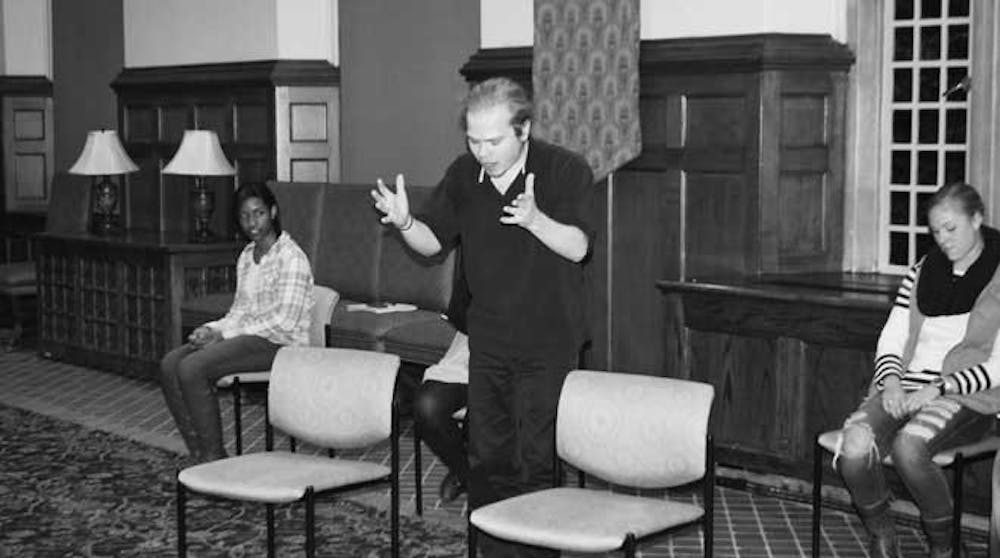"Dear Richmond Confessions: Not all Jamaicans are black."
The Theatre for Social Change class found that University of Richmond students believe stereotyping is the biggest social issue on campus, said sophomore Gloria Miller, a member of the class. After conducting research to come to this conclusion, the class prepared for its "campus tour," during which the students performed various skits that depict scenarios of stereotypes that occur on the Richmond campus.
The class performed for the Intervarsity Christian Fellowship Wednesday, Nov. 13, following the group's meeting in Jepson Hall. The first skit depicted three girls swapping weekend stories at the sink in a dorm bathroom, where two of the girls questioned the differences between Caribbean parties and those held in the United States.
The second skit situated a girl tabling for her sorority event. She was enthusiastic in promoting the event to some people, but became withdrawn and apathetic when a girl excitedly expressed interest. The girl felt snubbed and ended the skit with, "Dear UR Confessions: I was looking forward to rushing in the spring."
Other skits showed a student in the Heilman Dining Center being encouraged to sit in the third room after he asked to sit with a group of athletes, and a male student being mistaken for a football player and subsequently being denied entrance to a lodge party.
"Not sure you belong here, man. Try next door. We're kinda full," the fraternity brother said, despite the pleas from friends that the boy was "cool."
The final skit staged a girl and her boyfriend stumbling home from a party, and the boyfriend ripping down the Christmas lights that a gay boy hung outside of his door. The girl failed to intervene, but said at the end of the performance, "Dear UR Confessions: To the victim of this crime, I'm sorry."
Following the 15-minute show, audience members were asked to say a one-word feeling they experienced during the skits. Students offered "exposed," "thought-provoking," "introspective," "disappointed," "uncomfortable" and "apathy." During the discussion, students said they had felt some of the stereotypes were out of ignorance, and that others had been deliberate.
Audience members were then invited to help re-enact a scene they would have staged differently. The class members acted the scene out exactly as they did before, and an audience member would yell, "Stop!" whenever he or she thought something different would have actually taken place.
Before preparing for the performance, the students spent time gathering research to come up with the chosen theme for the class, said Chuck Mike, professor of the Theater for Social Change class. Using Mike's analogy of RACE, which stands for Research, Analysis, Creation and Enactment, the group spoke to a cross-section of people on campus who differed in age, ethnicity, class and gender to find out what the most pressing issue on campus was, he said. After interviewing students and professionals and conducting online research, the class decided to focus on stereotyping.
The group then analyzed its research and examined the "sub-themes" of stereotyping. The class concluded that apathy, isolation, ignorance and prejudice were the most prevalent themes that result from Richmond stereotypes, Miller said.
When creating the skits, the idea emerged to use the popular Facebook page, Richmond Confessions, as a "motif to help make the presentation relevant to the issues on campus," said junior Kenton Meronard, another member of the class.
Enjoy what you're reading?
Signup for our newsletter
This semester, there are eight students in the class. Only two students are theatre majors, and because the class fulfills the university's visual arts requirement, it draws people from all majors toward the theatre, Mike said.
The group has performed the skits for various Greek organizations, Cultural Advisors and first-year seminar classes, Miller said.
"We chose groups who could proliferate change on campus," she said.
The examined theme changes with each class. Past themes have included communication, diversity, prejudice, homophobia, in-groups and conformity, Mike said.
The year-long class will move off-campus in the spring, when students will help children at the local Boys & Girls Club create their own skits.
The concepts explored in the Theatre for Social Change class have been examined and performed all over the world. Mike, who is from Nigeria, said that although his international experiences with these ideas had been an impetus for bringing Theatre for Social Change to Richmond, campus needs also had played a role.
"When I arrived in 2005, the university had roughly 5 percent of students of color," Mike said. "LGBTQ issues weren't discussed. Campus thinking was quite linear. I felt that theatre had a role to play in helping our community move into a world of openness and inclusion."
While the audience was filing in before the skits began, Mike encouraged students to sit in the front row.
"They'll draw you in. Get in as close as you can," he said.
Contact reporter Renee Ruggeri at renee.ruggeri@richmond.edu
Support independent student media
You can make a tax-deductible donation by clicking the button below, which takes you to our secure PayPal account. The page is set up to receive contributions in whatever amount you designate. We look forward to using the money we raise to further our mission of providing honest and accurate information to students, faculty, staff, alumni and others in the general public.
Donate Now



